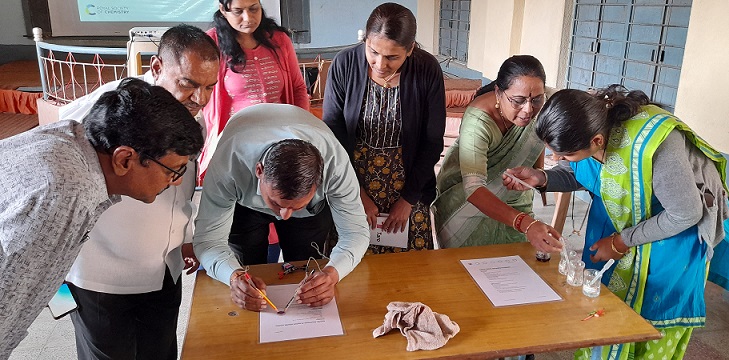|
English | मराठी | |||||
0
|
0
|
0
|
0
|
| Batches Completed | Workshops Conducted | Teachers Trained | Schools Covered |
| Workshops of Royal Society of Chemistry | ||||||||||
|
||||||||||
| Royal Society of Chemistry (RSC) is a non-profit organization established in 1841 when 77 scientists – including doctors, educationists, manufacturers, and entrepreneurs – formed the Chemical Society of London, with dialysis inventor Thomas Graham as the first President. The UK-based organization undertakes many education projects across the globe including India, where-in large scale science empowerment project under the banner of Yusuf Hamied Inspirational Science Programme, envisioning to enhance the skills and knowledge of Indian science teachers as well as inspire school students to study chemistry at university. | ||||||||||
| The aim of the teacher development programme is to give teachers new techniques for delivering and engaging concepts in Science effectively. Teachers are introduced to proven active learning techniques that can be applied easily in a science context, helping students to develop their conceptual understanding and enthusiasm for science. Teachers also explore some key science topics in-depth, learning about the misconceptions students may hold and how they can be tackled in the classroom. Teachers get the opportunity to learn some practical science experiments that can be adapted to be used in any setting, including those with no traditional laboratory facilities. |
||||||||||
| Hemant Lagvankar works as a Teacher Developer and conducts training workshops for the Royal Society of Chemistry (RSC) under Yusuf Hamied Inspirational Science Programme. • In the academic year 2021–22, from August 2021 to May 2022, he conducted 186 workshops, training 1,237 science teachers from 815 schools. • In the following academic year, 2022–23 (June 2022 to May 2023), he trained 1,569 teachers from 1,064 schools through 162 workshops. • During the academic year 2023–24, from June 2023 to May 2024, he conducted 126 workshops, training 1,831 science and mathematics teachers from 1,034 schools. These workshops were primarily held in Katra, Kathua, Kishtwar, Anantnag, and Kupwara in Jammu & Kashmir; in the districts of Kolhapur, Sangli, Nandurbar, Dhule, Nashik, Satara, Aurangabad, Osmanabad, Mumbai, and Raigad in Maharashtra; and in Panaji, Goa. • In the academic year 2024–25 (June 2024 to May 2025), Hemant Lagvankar conducted 42 teacher training workshops, reaching 677 teachers from 470 schools. These workshops were held primarily in Basti (Uttar Pradesh), Mapusa (Goa), Jaipur (Rajasthan), and in the Maharashtra districts of Satara, Kolhapur, Ratnagiri, Nandurbar, Mumbai, and Thane. |
||||||||||
During the pandemic, the workshops were conducted on an online platform, with each session lasting approximately two and a half to three hours. Teachers from various districts of Maharashtra—including Nandurbar, Dhule, Nashik, Nanded, Thane, Mumbai, and Pune—actively participated in these training sessions. Following the guidelines provided by RSC, each batch was limited to 15 to 25 teachers to ensure active participation and meaningful engagement from every attendee. From 23rd September 2022, offline training workshops in a face-to-face environment are being conducted regularly. Two days training programme is conducted for a batch of around 30 to 45 Science teachers. |
||||||||||
| Collaboration with Regional Academic Authority (RAA), Mumbai, Government of Maharashtra : | ||||||||||
RAA is established by the State Government of Maharashtra as a center of guidance for educational institutes and schools in a certain region. RAA also works as a platform for research and experimental work in the educational domain. It also organizes programmes to train teachers the innovative teaching methods. With the support of RAA, Mumbai, Hemant Lagvankar conducted 96 workshops for 32 batches and trained 662 Science teachers from 445 schools in Mumbai and Suburbs in the academic year 2021-22. Out of 662 Science teachers, 289 teachers were from 222 Mumbai Municipal Schools. |
||||||||||
| During During the academic year 2022–23, training workshops for teachers from schools in Thane district were organized in collaboration with RAA, Mumbai. Hemant Lagvankar conducted the training of 14 batches of teachers across 42 online workshops held between July 14 and September 14, 2022. A total of 243 teachers from 185 schools in Thane district were trained through these workshops. | ||||||||||
| Participants' Feedback about the Training Programme: Teachers enjoyed the workshops and found them highly beneficial for their teaching practices. Many participants mentioned that they had never experienced such a unique type of training before. The teachers actively engaged in the workshops and participated enthusiastically in various activities throughout the sessions. |
||||||||||
| Impact in the Classrooms: A teacher training programme truly makes an impact when it goes beyond the workshop and comes alive in the classroom. That’s exactly what happened—many teachers enthusiastically adopted the hands-on methods and creative techniques in their everyday teaching. The result? Science lessons became more interactive, engaging, and fun! Students not only enjoyed the learning process but also understood complex concepts with greater clarity and excitement. |
||||||||||
| Execution in Classrooms | ||||||||||
| About the Workshops: | ||||
Module: |
Training Outcome:
|
|||


 Profile
Profile